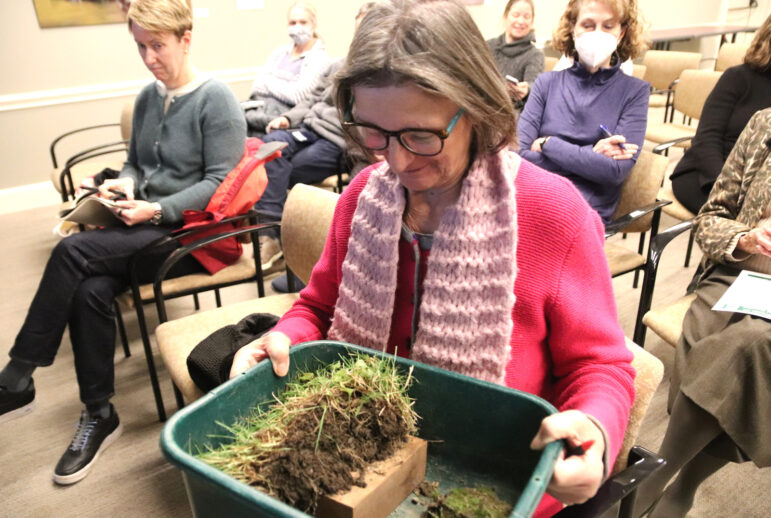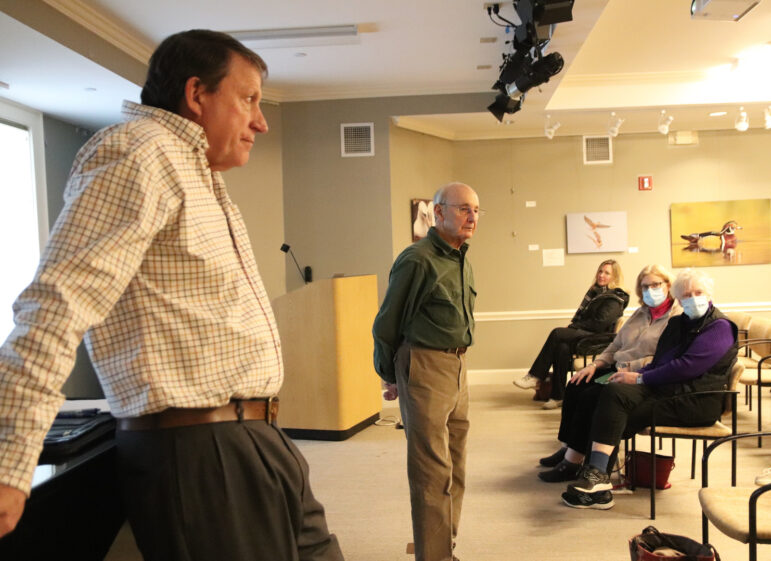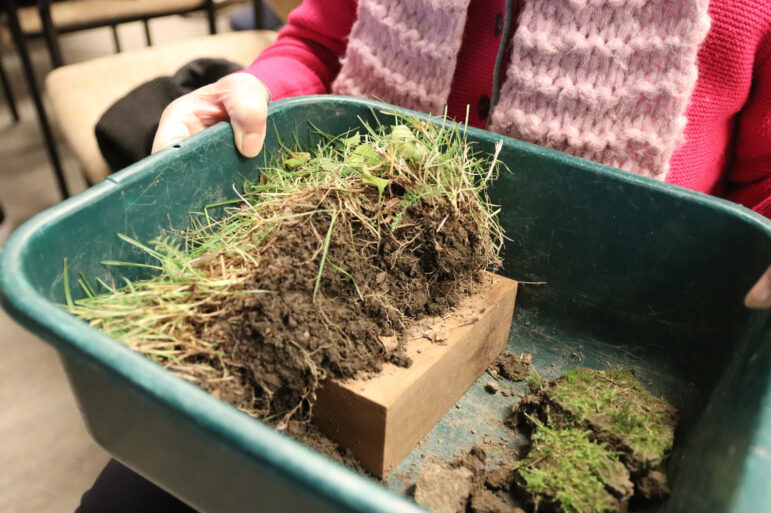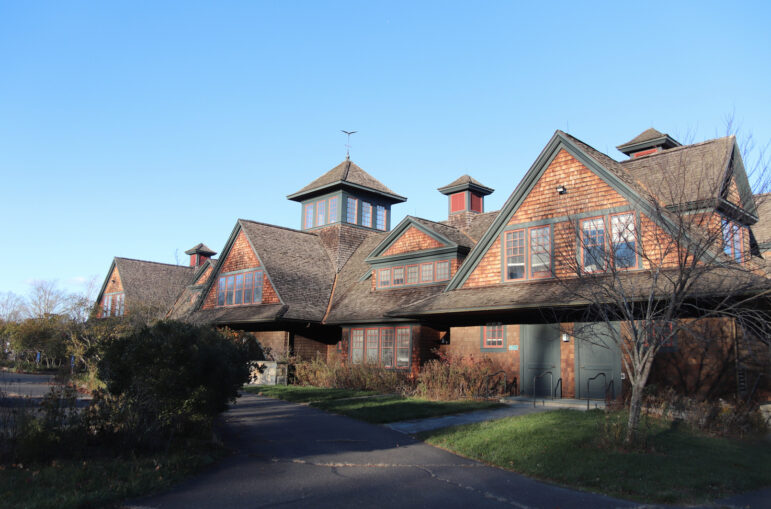Ecological Landscaping: Inviting Nature to Do the Work Instead of Chemicals
A collection on Ecological Landscaping at Audubon Greenwich that was started prior to the pandemic resumed in individual on Sunday, thanks to the initiative of Kim Gregory.
On Sunday, Biologist Jim Carr and Grasp Gardener Andy Chapin contrasted industrial lawn treatment with ecological garden and backyard care.
Industrial lawn care generally depends on hired crews, chemical substances and loud machinery. With ecological garden and back garden care, nature does a lot of the operate.
“What small business does Audubon Center have in back garden instruction when their focus is birds?” Mr. Carr requested. “There has been an alarming decline in the fowl populace, and just one of the most important factors is the way attributes are being managed.”
Though most people today check out the great lawn as totally environmentally friendly without the need of a one weed, Mr. Carr mentioned, “There is a significant expense in time and dollars, but the most important charge is ecological.”


When leaves are ground up by a mower and left on a garden, along with grass clippings, that presents vitamins and minerals to the grass and acts like mulch to suppress weed progress. It also insulate the soil and roots throughout the wintertime.
Ground up leaves decompose and increase vitamins back to the soil. Then, in the spring there is no will need to deal with the soil with chemicals.
Industrial garden care executed by gasoline fueled equipment consists of lawnmowers, leaf blowers, de-thatchers, aerators, spraying products. The apply also relies on fertilizers and pesticides manufactured on an industrial scale in chemical crops.
An choice to a eco-friendly, weed-no cost and leaf-free of charge lawn is to allow the organic ecology to exist.
The 280 acre Audubon Greenwich character protect is an example of ecological administration, with its thriving forests, meadows and wetlands.
“I can assure you that no just one is out there implementing fertilizer to this place,” Mr. Carr mentioned. “Nor is any individual spraying for pests. Nevertheless nature is managing this landscape magnificently, as she does all of her landscapes.”
Mom Mother nature Recycles Nutrition to Create Humus
In fall lifeless plant material results in being food stuff for soil organisms. “They ingest it. They excrete it out, and it is a food items chain. Their excretions are a food source for other soil organisms,” Carr spelled out. “It sounds disgusting, but which is how mother nature operates. The nutrition go down the food chain and the final use of excretions is humus.”
Carr described humus as nature-made compost.
The manufacturing of humus requires put over the wintertime. In spring it is readily available to aid lush plant progress.
Mr. Carr talked about the great importance of biodiversity. The much more species there present, the more opportunity to catch the attention of ‘beneficial predators’ who prey on and get rid of the pests.
Valuable predators are mostly birds, but also bugs.
“In a steady natural environment where by humans don’t interfere, each pest has at minimum just one enemy that wishes to make a food of it,” he mentioned. “They’re not going to reduce them, but they’ll continue to keep them down so they don’t lead to appreciable harm.”
Mr. Chapin mentioned indigenous trees insert value, and that the major purpose birds present up at Audubon each individual spring is for the “caterpillar explosion” from native trees. The caterpillars are “protein packs” that give the birds strength.
Industrial Lawn Care: Chemical Fertilizers, Insecticides, Herbicides, Irrigation, Fungicides
Mr. Carr stated with industrial lawn treatment products and services that exercise industrial lawn treatment, when the garden is mowed, and grass clippings are bagged and disposed of, vitamins for the soil and trees are taken out.
Carr likened healthful soil to a extra fat, nutrient-wealthy financial institution account.
“There are only so several vitamins and minerals there. If they continue to keep remaining eliminated, it’ll go bankrupt. These nutrition require to be replaced.”
Industrial lawn treatment capabilities chemical fertilizers high in nitrogen, potassium and calcium. By regulation they have to be h2o soluble, which suggests they have to be immediately available to the vegetation.
When there is no humus in the soil, and nourishment comes from fertilizer, crops just take up nitrogen more rapidly than it can be included into the tissues of the plant. The nitrogen backs up in the metabolic chain in the plant.
And, since insects require nitrogen for advancement and reproduction in the spring, they will go immediately after the free of charge nitrogen in the grass.
“How do we address that trouble? Pesticides,” he stated.
Due to the fact most persons take into consideration a “weed” just about anything that is not turf grass, they’ll use herbicide.
Then, in summer when lawns start out to dry out and develop a difficulty with soil acidity, people implement Lyme, when humus would in any other case buffer the acidity.
Humus absorbs h2o like a sponge and retailers it. As the soil begins to dry out in summer months, the humus will release the drinking water little by little to the plants, to try to retain an even moisture in the soil.
“Nature truly has her act together,” Carr stated.
“But if the garden has been deprived of soil and is lacking humus, how is that solved?” Carr questioned. “Irrigation.”
Then, when grass dies it creates thatch.
Leaves, stems and roots accumulate when they die and start off to clog the lawn.
Enter the industrial lawn care’s de-thatcher, a gasoline run equipment.
“All this organic content that would make pleasant humus is just taken away,” he claimed.

Healthier soil is like a sponge with pores. Air circulates, bringing oxygen to the roots and taking carbon dioxide absent.
Given that there’s no humus in a chemical garden, there is no porosity.
If the soil compacts and roots really do not get oxygen, they shorten and ultimately die.
“How’s that corrected?” Carr requested. “Aeration.”
Mr. Carr explained aeration as a whole squander of time and revenue.
“If you observe these equipment work, they’re poking holes. All those couple holes do practically nothing, and when it starts off to rain, those people holes fill up.”
Carr and Chapin’s guidance? Make it possible for nature to develop humus: Go away grass clippings in location. In slide, do not blow the leaves mow them with an ordinary walk-at the rear of mower to grind them up and leave them in area.
When the leaves are floor into smaller items, they break down promptly and will have vanished by spring.
“There will be a little brown in the garden and some individuals may perhaps object to that,” Mr. Carr mentioned. “But if you can put up with that, there’s absolutely no explanation to blow away the leaves.”
In addition to, Carr mentioned there has been “mission creep” in the use of leaf blowers, with crews blowing lawns all summer season very long.
His recommendation was to ask the lawn crews to mow and not blow.
Additional, he explained quite a few assets owners have much more lawn than they need to have for little ones and canine, and some lawn can be replaced with ground cover, ecologically managed flower beds and pathways.
Valuable Predators and Native Plants
A hospitable atmosphere with native plants attracts advantageous predators like Ladybugs and birds, who get vitality from the plant nectar, in change, assistance handle pests.
Also, the insects deliver the plant a assistance by spreading pollen to aid the plant reproduce.
“If you use insecticides and eliminate all the bugs, the types you do not want will arrive back quicker,” Chapin mentioned. “Within 10 times you have a new cycle of mosquitos with no competition. In the meantime the regular dragonfly lifetime cycle is two to a few yrs.”
Some effective predators will overwinter inside lifeless flower stems. Some will lay eggs in leaf litter.
So Mr. Carr suggests not slicing down dead flower stalks due to the fact they supply shelter for beneficial bugs about the winter season.
Fascinated in pursuing ecological landscaping? On Dec 11 from 1:00-3:00pm, Carr and Chapin will direct a session at Audubon on how produce your possess ecological back garden.
The celebration is free but registration is necessary. Register by emailing [email protected]

